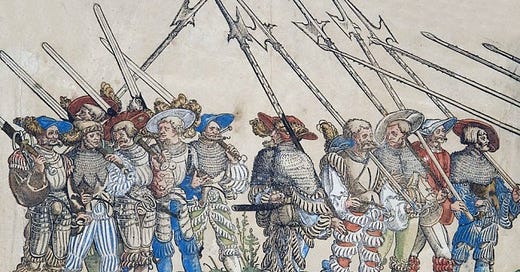One of the key concepts of domain play is the build-up and command of armies. As a warrior advances in ability and prowess, he should be gathering warriors around him. King David had his Mighty Men, Robin Hood had his Merry Men, Arthur had his Round Table, Griffith had The Band of the Hawk, etc. I’ve talked about this several times over and many others have too. However, I think it’s important to discuss the process of how a fighter can turn a handful of hired mercenaries into a war band of loyal retainers. With the proper investment of gold, time and resources, expendable hirelings can become loyal friends and followers.
For those of you who are unfamiliar with the arguments I’ll be relying on for this article, I highly recommend that you watch Jon Mollison’s video on Exponential Fighters. In a nutshell, a first-level Fighter is already a seasoned combatant that is roughly the equivalent of a sergeant, having served at least a five-year tour based on the starting gold that a Fighter receives in Advanced Dungeons & Dragons. With the proper investment in manpower in addition to equipment, a Fighter can begin play with a handful of men-at-arms under his command. What are these men-at-arms though? They are mercenaries. They’re hired hands and, if you aren’t careful with how you treat them, they could just as easily turn on you should that be more profitable. As an example, let’s say that Haldor the Relentless, a Fighter PC, routinely uses hirelings as expendable lemmings. A smart GM will use that against Haldor. If the men he abandoned or betrayed survive, their opinion of him as a commander will be altered. They may actively seek revenge but they may also just conclude their stint with the party and inform everyone in the various mercenary guild that Haldor the Relentless is petty and incompetent. Suddenly, it’s really hard for Haldor to hire people. Haldor has a bad reputation and the quality of men he can convince to work for him will lower. His men will desert on a more regular basis and, by the time he reaches name level (generally 9th level), he’ll only have the bare minimum of followers if that.
By contrast, let’s look at Steed the Dashing, another Fighter with a different approach. Steed expects a lot from his men, frequently asking them to do difficult and dangerous things, but he’s always right there with them in the thick of it. If things go sideways, Steed makes sure to pay bonuses to the survivors who demonstrate bravery and he always delivers the wages of fallen men to their next-of-kin if he can find them. Being one of Steed’s men-at-arms is far from easy, he’s frequently hunting monsters, exploring dungeons and hiring himself out to lords in need of manpower for their wars. He’s an honorable man though and he values even the greenest recruit in his war band. As a result, many of Steed’s hirelings opt to resign with him when their contract is up. As a matter of fact, he’s starting to build up a core group of seasoned mercs that keep coming back. Steed gives the most experienced of this group a raise in pay and gets him trained up for command. By the time Steed hits 5th level, he’s made some key investments in his men and now he has two sergeants (1st level Fighters) promoted from his band of mercenaries and each of them commands 10 men-at-arms. By 9th level, he naturally attracts 20 men-at-arms led by a 5th level Fighter, but he already has a company that size with another 5th level Fighter. Steed has doubled his manpower by being good to his men, investing in them and giving them roles beyond just “Hired Monster Bait.”
What you can see with both of these examples is not just that you can multiply your forces early on but that the way you interact with hirelings can and should impact the way that hirelings interact with you. If you’re a bad employer, hirelings won’t want to work with you and good help will be very hard to find. If you’re a good employer, then your hirelings will naturally turn into followers. Part of having a living campaign is having realistic reactions and consequences to player behavior. One of the best ways to show this in your game is to reward players who treat their hirelings well with increased loyalty and opportunities to advance them. Likewise, players who abuse the help will find themselves unable to retain staff or worse, marked for death by a vengeful ex-employee.




